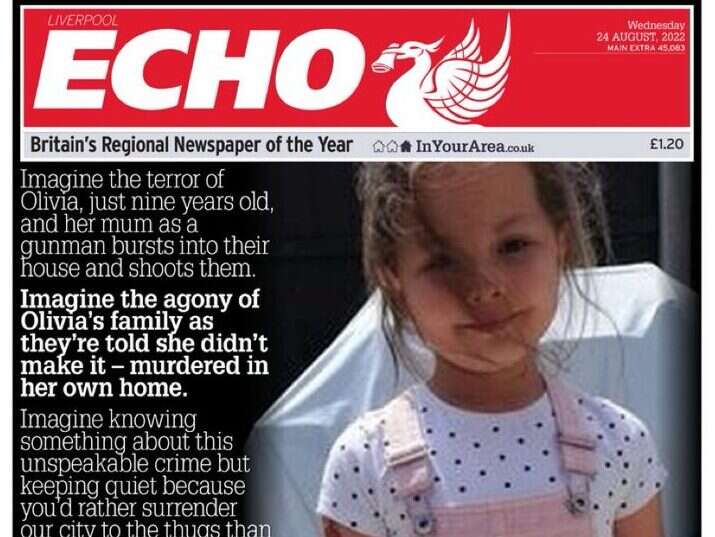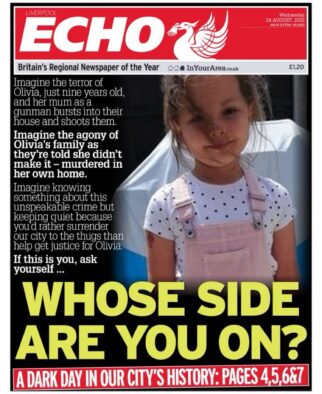
The editor of the Liverpool Echo has said parent company Reach’s business model is working – but that government support was needed to guarantee a “bright future” for local news.
Maria Breslin said although there are challenges facing the commercial advertising model, these are “not insurmountable”.
She urged the Government to provide support, including by passing much-anticipated legislation that would empower the Digital Markets Unit to begin forcing Google and Facebook to pay for news.
Speaking at the launch of the News Media Association’s week-long Journalism Matters campaign at Parliament on Monday, Breslin said: “We have a business model that I believe works, but we do need a helping hand.
“It’s wrong that our Facebook audience will never see some of our most important work because of an algorithm I just cannot begin to try to understand, or that the BBC will always rank higher in search engines when we have the boots on the ground.
“Our commercial ad revenue based model has its challenges, but these challenges are not insurmountable, and the reward is high. Free and trusted news for all, not a nice-to-have based on the ability to pay, and that is important in cities such as Liverpool, where financial challenges and deprivation are widespread.
“What I care about is the long-term sustainability of local news. Making it a profitable business is a key part of ensuring it remains powerful and relevant. That’s why it’s so critically important for the legislation giving the new digital regulator, the Digital Markets Unit, should be brought to Parliament without any further delay.”
Former culture secretary John Whittingdale also backed the need for the Digital Markets Unit at the event, saying: “We will go on arguing that that bill needs to be introduced into Parliament and put on the statute book as quickly as possible because the abuse of dominant power by the tech platforms continues and we need intervention to strengthen the hand of the publishers to stop their content being exploited without proper reward by those platforms.
“So I shall be certainly continuing to call for the Government to act, as they have promised to do, but sooner rather than later.”
Breslin added: “Whatever technological changes lie ahead as the way news is delivered and consumed continues to evolve, I am confident that the editors who come after me will always carry out that responsibility on behalf of the people of Merseyside just as they have since the paper first hit the streets in 1879.
“That is why we have a distinguished past – and that is why, with a little support from the government, we have an equally bright future.”

Among other campaigns, she pointed to the paper’s coverage of the fatal shooting of nine-year-old Olivia Pratt-Korbel in her own home in August, including its “bold and unrepentant” front page headlined “Whose side are you on?” that garnered international headlines in its condemnation of “no-grass culture”.
“At times like this it feels regional media faces more scrutiny, because when the national media go home, we’re still accountable to our audience and our content creation decisions are made accordingly,” Breslin said.
“Will this help the police investigation? And will it cause unnecessary suffering to Olivia’s family? They were always the questions at the forefront of our mind before publishing.
“I’m under no illusion that our future lies in digital publishing. But newspapers are far from niche products and the impact of a powerful front page is undeniable.”
A brief Press Gazette experiment looking at how the Liverpool Echo and BBC stacked up in search results brought up mixed results. The BBC’s website often appears higher than commercial news websites due to the fact it is ad-free and therefore loads faster, a trait favoured by Google.
A Google search for “Olivia Pratt-Korbel” in the afternoon on 1 November brought up a Liverpool Echo article ahead of the BBC and then Sky News in the main results, while in the news results the Echo remained on top followed by National World and then Sky.
A search for “Liverpool shooting” brought up the BBC ahead of the Echo and then Sky, as well as a snippet about the Echo to the righthand side. In the news tab, all but three results in the first seven pages were from the Echo.
The Echo also beat the BBC in searches for Liverpool FC and “Liverpool Eurovision”.
Email pged@pressgazette.co.uk to point out mistakes, provide story tips or send in a letter for publication on our "Letters Page" blog

